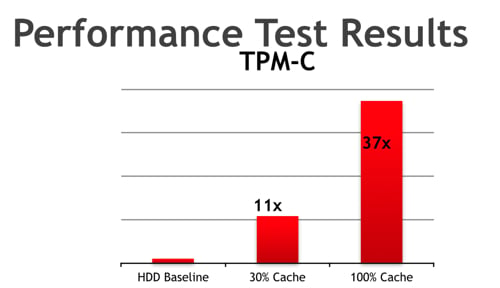This article is more than 1 year old
Dell PowerEdge hooks up with SanDisk, stuffs servers with DAS Cache
Caching software delights
Dell's next-generation PowerEdge servers are going to use DAS Cache SSD caching software from SanDisk.
The R730, R730XD, R630, T630, and R920 servers fitted with direct-attached disk storage will have the DAS Cache software. It complements Dell's existing Fluid Cache for SAN, network-attached block storage.
An R730-XD saw a 37 times speed increase with a data warehouse-type app, using 18 x 200GB SATA SSDs to cache 16TB of app disk (8 x 2TB 7.2K SATA disks), not particularly fast disks it must be said, which would highlight a flash cache speed boost.

DAS Cache speed boost with Dell R730-X server. The 30 per cent cache is 120GB of SSD capacity.
SanDisk has flash caching and storage memory software products, courtesy of its Fusion-io acquisition and its purchase of FlashSoft for PCIe caching software in 2012.
Its software portfolio includes:
- ExpressCache software so Ultrabooks, notebooks and PCs can use SanDisk SSDs,
- FlashSoft SSD caching software to reduce I/O latency in VMware vSphere, Windows Server and Linux environments, now known as DAS Cache,
- ioTurbine Direct for physical server acceleration,
- ioTurbine Virtual for virtualisation-aware disk, file, volume and VM-specific caching,
- ioControl hybrid flash/disk array software,
- ioVDI software for virtual desktop infrastructure acceleration,
- Virtual Storage Layer (VSL) software that powers the ioMemory flash card platform,
- ioSphere management for ioMemory flash card memory, and
- ZetaScale Software - a key value object store that provides system level optimisation for specified In-Memory Compute (IMC) and NoSQL database applications. It uses DRAM as a cache.
That's a lot of flash-related software. Dell has decided it needs to speed apps that rely on disk IO by caching their hot data in SSDs, any brand SSDs, and is OEM'ing SanDisk's DAS Cache software to do it. The software supports both write-through and write-back caching.
It supports multiple host operating systems, including Windows ( 2008 R2, 2012, 2012R2) and Linux (RHEL 6.5, 7; SLES 11 SP3; RHEV), and Hyper-V and KVM. VMware and Ubuntu support is coming, VMware in 2015 – it's a pity VMware support isn't ready up-front.
The cache can scale up to 16TB with up to four caches per server, to enable different levels of quality of service (QoS). SanDisk says OLTP, analytics (BI and OLAP), high-performance computing and general enterprise apps can all get accelerated by this caching.
Naturally it's sold, supported and validated by Dell, and we suspect SanDisk is pleased as punch with this deal. ®
